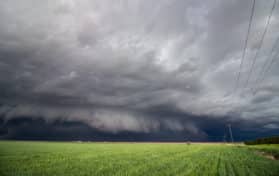
Who is Bjorn Lomborg? Is he a climate change denier? His frequent appearances on Fox News has earned him a reputation for being “anit-climate change,” but, Lomborg is actually someone who believes in climate change. He is the head of a think tank organization, the Copenhagen Consensus Center; through his think tank, Lomborg promotes common sense solutions to environmental issues.
Lomborg recently authored “False Alarm: How Climate Change Panic Cost Us Trillions, Hurts the Poor, and Fails to Fix the Planet.” He has actually served as the Director or Denmark’s National Environmental Assessment Institute, and he regularly publishes articles on smarter ways to approach climate change as well as participates in public debates on the subject.
So, what does Lomborg have to say about climate change and how to address the topic?
In short, Lomborg has much to say. However, he sparked controversy when he stated that climate change is actually saving more lives than it is harming.
In September, Lomborg penned an article in which he acknowledged the record-breaking warm temperatures across the globe. He points to a report in which the UN Intergovernmental Panel on Climate Change stated that “the frequency and intensity of cold extremes have decreased.” This is important, Lomborg says, because “globally, many more people die for cold than from heat.”
A recent study in The Lancet showed that temperature rises over the past twenty years have contributed to the deaths of 7,200 citizens of Canada and the United States. However, the study also showed that warming trends – a definitive effect of climate change – means that each year, the same areas avoid 21,000 deaths due to extreme cold.
Lomborg says emphatically, “We are badly informed if we don’t hear both parts of this story.”
Lomborg also points to flooding in Germany and Belgium in 2021 that most attributed to climate change. However, he says, the data does not support this supposition. Across the globe, while there are some rivers that are seeing more flooding than in the past, the data shows that there are many more rivers that are seeing a decrease in flooding. In fact, in Europe, the UN climate panel report looked at all rivers across the continent and found that most rivers examined were flooding less than in the past.
Lomborg went on to say that this issue lies in a warning system rather than blaming climate change. He said that because more people are building homes on flood planes, when a river floods, these people have nowhere to go. However, with a well-functioning warning system, these individuals could move out of danger in plenty of time, saving lives.
Similarly, wildfires in the United States are often blamed on climate change. However, the statistics kept by the American government beg to differ. To date in 2021, the burnt area is the seventh-lowest in the past two decades! In fact, only eleven percent of the area burned in 2020 compared with the same area in the early 1900s.
Lomborg attributes what is believed to be a rise in wildfires and other devastating weather is the presence of cameras everywhere and a twenty-four hour news cycle that is consistently posting videos and photos of natural disasters. If one remembers the Don Henley song “Dirty Laundry,” “People love it when people lose . . . It’s interesting when people die.” Is it possible that the this stream of natural disasters around the world is televised simply for ratings – and so politicians can push more climate change policies through?
Lomborg says the scientific community has statistics for global deaths due to climate-related natural disasters. He says this is all present and can be viewed in the International Disaster Database. He also points out that in the 1920s, the number of people killed by natural disasters averaged about 500,000 per year. Today, that number hangs around 18,000. That’s almost a 96 percent reduction in the number of weather-related deaths attributed to climate change.
Lomborg cautions that the numbers do not mean we shouldn’t work to lessen climate change, however. Rather, Lomborg points to doing so in a smarter way. He believes that we can utilize technology to do so; however, it is important that the public sees all the statistics regarding climate change, not just the ones that might promote public policy.





